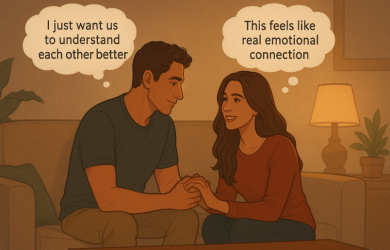Dissociative Fugue in Relationships: Impact & Ways to Cope

Heal & Grow Daily for a Happier Relationship
👉 Subscribe FREEKey Takeaways
Marriage.com AI Quick Summary
Did you know that dissociative fugue, a rare but severe mental health condition, can cause a person to completely forget their identity, leading to unexpected travel and an entirely new life?
Imagine waking up one day, not recognizing your loved ones, your home, or even your own name. This unsettling reality is what a fugue dissociative disorder can do, and its impact on relationships can be devastating.
What if your partner suddenly didn’t know who you were? Coping with the fear, confusion, and loss can be a lot in such a situation.
The emotional toll of living with someone who has experienced a fugue state can be overwhelming, leaving both partners feeling lost and uncertain about the future.
This article explains 7 ways fugue dissociative states impact relationships, the treatments available, and how to cope when faced with such a life-altering experience.
Understanding what is a fugue state and how to manage it is essential for anyone touched by this disorder.
What is dissociative fugue?
Dissociative fugue is a rare and complex psychological disorder classified under the umbrella of dissociative disorders.
Dissociative disorders involve disruptions in a person’s memory, identity, consciousness, or perception of the environment.
Dissociative Fugue specifically manifests as sudden and unexpected travel, often to a different geographical location, coupled with an inability to recall one’s identity or past.
Affected individuals may take on a new identity or assume a different lifestyle, often leaving loved ones and partners bewildered.
It’s important to note that dissociative fugue disorder is distinct from voluntary actions or planned travel. It is not a conscious decision, and the affected individual is genuinely unaware of their actions and the reasons behind their sudden journey.
Due to its rarity and the challenges in diagnosis, individuals experiencing dissociative fugue and their partners often face unique difficulties in understanding and managing the condition.
What causes dissociative fugue?
Research suggests that dissociative fugue affects approximately 0.2% of the population, but its occurrence significantly increases in the aftermath of wars, accidents, and natural disasters.
Dissociative fugue is a mysterious and complex condition that leaves many people wondering, “How does this even happen?”
At its core, a fugue state is often triggered by extreme stress or trauma, leading someone to disconnect from their identity and surroundings. But what exactly causes this dramatic escape from reality?
- Severe psychological trauma: Experiences such as abuse, natural disasters, or intense emotional conflict can overwhelm the mind, causing it to shut down parts of itself to protect the individual.
- Dissociative amnesia vs fugue: While both involve memory loss, dissociative fugue takes it a step further by leading to sudden, unplanned travel and the assumption of a new identity.
- Underlying mental health conditions: Sometimes, fugue states are linked to other dissociative disorders, making it crucial to differentiate between dissociative fugue vs amnesia for proper diagnosis and treatment.
6 challenges faced by partners of individuals with dissociative fugue
Partners of individuals experiencing Dissociative Fugue may face various challenges in their relationships and everyday lives. Some of these challenges include:
1. Emotional distress
Partners may experience emotional distress due to the sudden and unpredictable nature of dissociative fugue episodes. They may feel helpless, frustrated, and confused as they try to navigate their loved one’s memory loss and unexpected behaviors.
According to Christiana Njoku, LPC:
Caring for a partner with dissociative fugue can be challenging, and If care is not taken, it may cause emotional distress for the caring partner.
2. Uncertainty and fear
Partners may constantly live in a state of uncertainty, not knowing when a dissociative fugue episode may occur or how long it will last. This can create a constant state of fear and anxiety, being constantly on edge and worried about their partner’s well-being.
3. Strained communication
During a fugue dissociative disorder episode, individuals may have limited or no memory of themselves or their past. This can make communication difficult and strain the emotional connection between partners. Partners may struggle to maintain a sense of connection and understanding during these episodes.
4. Caregiving responsibilities
Partners often take on the role of caregiver during and after dissociative fugue episodes. They may need to ensure their loved one’s safety, manage daily activities, and provide support during the recovery process. This role can be physically and emotionally demanding, leading to feelings of exhaustion and burnout.
Christiana Njoku highlights that:
Couples should be empathetic towards their partners, particularly in their low moments, and be there to care for each other.
5. Impact on intimacy
Dissociative fugue can have a significant impact on the intimacy and closeness within the relationship. Partners may find it challenging to maintain emotional and physical intimacy during episodes and may experience a sense of loss or distance in their connection.
6. Lack of awareness and understanding
Dissociative fugue is a rare and often misunderstood condition. Partners may face challenges in finding accurate information, support, and resources to help them navigate the complexities of the condition. This lack of awareness and understanding can further contribute to their feelings of isolation and frustration.
It’s important for partners to seek support from mental health professionals, join support groups, and engage in open and compassionate communication with their loved ones to address these challenges and find effective coping strategies.
7 ways dissociative fugue impacts marital relationships
Dissociative Fugue, a complex and often misunderstood condition, poses unique challenges to marital relationships. This comprehensive examination delves into the intricate and multifaceted ways Dissociative Fugue can reshape the landscape of a marital relationship. Here are some of them:
1. Communication breakdown
Individuals experiencing dissociative fugue often struggle to articulate their thoughts, emotions, and experiences during and after an episode. This difficulty in communication can leave partners in the dark about the reasons behind the fugue state and hinder effective emotional support.
2. Emotional distance
The nature of episodes can create emotional distance within the marital relationship. The affected individual may withdraw emotionally, finding it challenging to connect with their spouse due to the transient and unpredictable nature of the condition.
3. Trust issues
The unpredictability of episodes can undermine the trust between partners. The sudden disappearances and the inability to predict when they may occur can erode the foundation of trust, leaving partners uncertain about the stability of their relationship.
4. Role strain
Partners often face challenges in managing their roles as caregivers and supporters. Balancing the need for assistance during a fugue episode while respecting the affected individual’s desire for independence can create strain, impacting the equilibrium within the relationship.
5. Increased stress
The ongoing uncertainty and worry associated with dissociative fugue contribute to heightened stress levels for both partners. Coping with the unpredictability of the episodes adds an extra layer of emotional and psychological strain to the marital relationship.
6. Social isolation
Partners may voluntarily withdraw from social activities to shield the affected individual from potential triggers. This social isolation can lead to a sense of loneliness within the marriage and limit the external support available to both partners, intensifying the impact of the condition.
7. Grief and loss
The episodic nature of dissociative fugue can trigger feelings of grief and loss in partners. During episodes, the affected individual may seem like a different person, prompting partners to mourn the temporary absence of the person they know and love.
This emotional burden adds complexity to the challenges already present in the relationship.
How is dissociative fugue treated?
Treating dissociative fugue is a delicate process that focuses on addressing the underlying trauma and helping the individual regain their sense of self. Since dissociative fugue’s symptoms often stem from severe stress or trauma, the primary goal is to create a safe environment for healing.
- Psychotherapy is a key component of fugue state treatment. Therapists work with individuals to explore the root causes of the fugue, helping them process traumatic experiences and reintegrate lost memories. Techniques like cognitive-behavioral therapy (CBT) are often used to change negative thought patterns and behaviors that contribute to the fugue state.
- Medication might be prescribed to manage any co-occurring mental health conditions, such as anxiety or depression, which often accompany dissociative fugue. While medication doesn’t treat the fugue state directly, it can alleviate some of the distressing symptoms that make recovery more challenging.
- Hypnotherapy is another option that can be effective in helping individuals access repressed memories and understand the triggers for their fugue episodes. Through guided sessions, therapists can assist in unlocking parts of the subconscious that may hold the key to understanding and overcoming the fugue state.
5 ways to cope with dissociative fugue in marriage
Coping with Dissociative Fugue in a marital relationship requires a blend of understanding, patience, and strategic approaches to address the unique challenges posed by this condition. Here are five ways to cope, each detailed with examples:
1. Open communication and education
Establishing open lines of communication is crucial.
Partners should educate themselves about Dissociative Fugue to understand its symptoms and impacts better. This knowledge can foster empathy and patience.
For example, a couple might set aside time each week to discuss their feelings and experiences openly. They could also attend therapy sessions together or read educational materials to gain a deeper understanding of the condition.
2. Creating a support system
A support network can provide emotional support, practical advice, and a sense of community.
Building a strong support system is essential. This can include family, friends, mental health professionals, and support groups.
For instance, a partner might join a support group for spouses of individuals with dissociative disorders, where they can share experiences and strategies with others who understand their situation.
3. Establishing safety plans
Developing a safety plan for when a dissociative fugue episode occurs can provide a sense of control and security.
This plan can include steps to ensure the safety of the affected individual and how to communicate with family or medical professionals during an episode.
A couple could agree on a code word that the affected partner uses if they feel an episode coming on, and might also have a list of emergency contacts and a bag of essentials ready in case the affected partner needs to leave the house suddenly.
4. Flexible role adaptation
Being flexible with roles within the marriage can help manage the unpredictability of the condition.
Partners may need to take on different responsibilities depending on the state of the affected individual.
During a period when the affected partner is feeling more stable, they might take on more household responsibilities. Conversely, when they are struggling, the other partner might temporarily assume a larger share of these duties.
5. Prioritizing self-care and individual therapy
Individual therapy can provide a space for each partner to process their feelings and develop coping strategies.
It’s important for both partners to prioritize their own mental and emotional health.
The unaffected partner might engage in activities that promote relaxation and stress relief, like yoga or painting, and seek individual counseling to address feelings of stress or helplessness. The affected partner might also pursue individual therapy focused on managing symptoms of Dissociative Fugue.
Watch this video to learn more about what self-care really is through the wise words of Susannah Winters, who advocates being an entrepreneur without living the 24/7 hustle lifestyle:
Finding the way back
Dissociative fugue is a challenging and often bewildering experience, but it doesn’t have to define your life or your relationships.
Recovery is possible, and with the right support, you can find your way back to a place of stability and peace. It’s important to remember that healing takes time, and it’s okay to lean on those around you as you navigate this journey.
Whether you’re the one experiencing the fugue or a loved one supporting someone through it, know that there’s hope on the horizon.
With compassion, understanding, and the right treatment, you can overcome the impact of dissociative fugue and move forward toward a brighter, more connected future. Keep believing in the power of healing—one step at a time, you’re getting closer to reclaiming your life.
Stuck in conflict and unsure how to move forward together?
 Tips
Tips
Write your tip or submit a video tip
All tips are reviewed before the publishing.
Share this article on
Recent Articles
Related Quizzes
Heal & Grow Daily for a Happier, Healthier Relationship
👉 Subscribe FREE on YouTube We'd love your feedback!
We'd love your feedback!
 Expert Q&A
Expert Q&A
Ask your question related to this topic & get the support you deserve from experts.





















 Thanks for your feedback!
Thanks for your feedback!